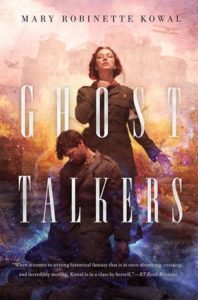
![]() Author: Mary Robinette Kowal
Author: Mary Robinette Kowal
Genre: Historical Fantasy
Publisher: Tor Books
Date: 16 August 2016
Source: NetGalley
Buy the Book – Goodreads
Ginger Stuyvesant is a medium for the British Army’s Spirit Corps during World War I. Each soldier heading for the front is conditioned to report to the mediums of the Spirit Corps when they die so the Corps can pass instant information about troop movements to military intelligence. While Ginger’s intelligence officer fiance, Captain Benjamin Harford, is away at the front, she discovers the presence of a traitor. Even worse, it is clear that the Spirit Corps is now being directly targeted by the German war effort. Ginger has to find out how the Germans are targeting the Spirit Corps and stop them.
From the moment I first heard the premise of this book, I knew two things: the first was that I would probably cry my eyes out reading this (I did), and the second was that there was A Thing that was bound to happen. I won’t elaborate on what The Thing is, but it was always obvious that it just *had to happen*, the setup was too perfect for it not to. I expected The Thing to take place at the end of the book in the final moment of victory, to better punch the reader in the feels. Instead The Thing happened very early in the book, meaning that the aforementioned punching in the feels happens again and again all the way through. This was fantastic storytelling, but also very upsetting and bittersweet. I spend a lot of my time reading this book with my throat constricting and a bit of dust in my eye.
I always love Kowal’s characters and this was no exception. I particularly loved Ginger for her resilience and strength of character, when her working day consists of sharing in the deaths of hundreds of soldiers in order to report on them to the British Army – not just viewing their deaths but actually living through their final moments and their fears in her own mind. She suffers so obviously from this on top of everything else, by the end I just wanted to give her a hug & make her a strong cup of tea.
It took me a little longer to warm up to Ben because of some of the period-typical attitudes he exhibits: when we first meet him, he has just learnt that the Spirit Corps is in danger, and immediately tries to get Ginger out of danger. Of course, he loves her and wants to protect her, only the way he phrases it is that she somehow has less of a duty to the war effort than he does because she is a woman. Predictably I found this very very annoying – I do think it’s good writing, because it sounds like something a gentleman of that period would say, but it doesn’t mean I rolled my eyes at him any less. But Ginger quickly puts an end to that silly notion, and apart from this one little hiccup, Ben and Ginger’s engagement is always portrayed as a relationship between equals, who have real respect and love for each other.
The book also has fantastic secondary characters, my favourite by far being Ginger’s Circle, a group of volunteers sensitive to the arcane, who support her during her shifts as a medium and keep her anchored to the real world. They are an extremely tight-knit group who all chose to come out to Northern France to help with the war effort, and go through so much together. You can’t help but admire their courage and loyalty and resilience. There are also several characters of colour, both in the ranks of the Spirit Corps and in the Army itself, which was great to see because it is historically accurate for World War I. Probably also historically accurate but quite a bit sadder is the way these characters are often mistrusted, summarily dismissed and generally given far too little credit for their work.
All in all, I loved this book but I am giving it a slightly lower rating than I did the Glamourist Histories series. I got choked up and teary-eyes quite a few times reading this, and I found the reading experience a bit draining. I would definitely still recommend this book to people (so they can get punched in the feels like I was), I think it’s beautifully done but intentionally bittersweet. I mean, if you write a book about WWI and your readers end up feeling all light and happy and fluffy, you’re probably doing it wrong.